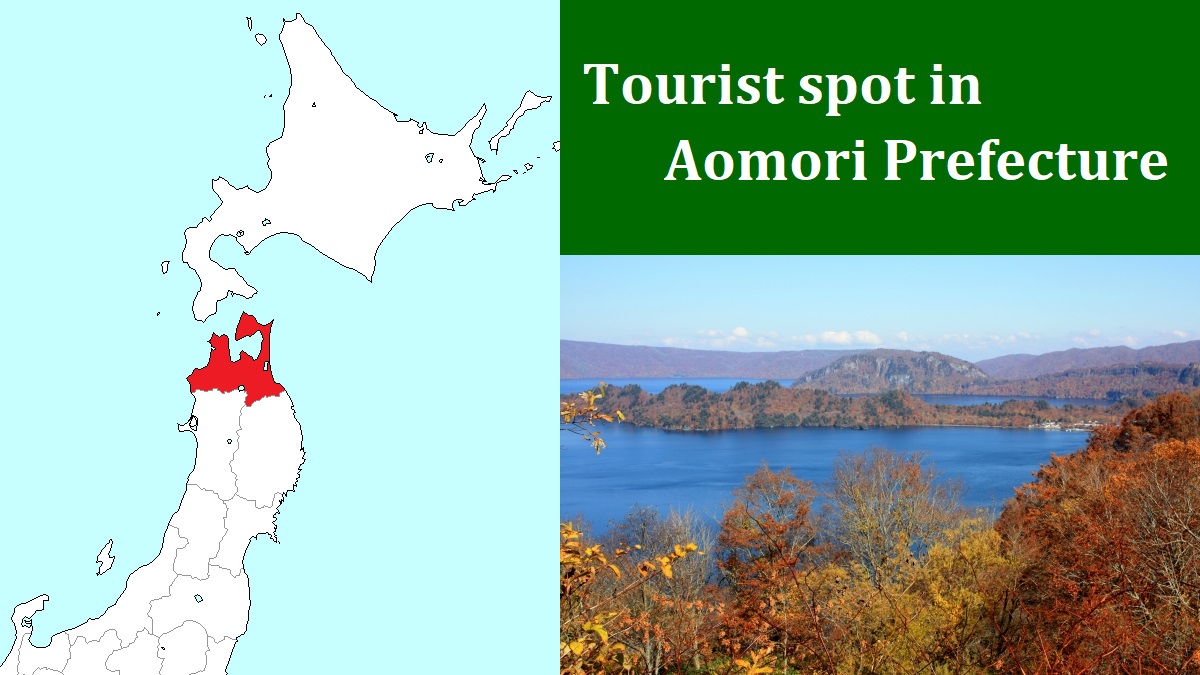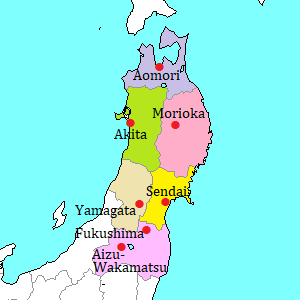Hakkoda mountains [八甲田山]
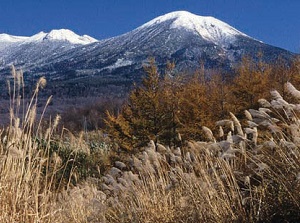
Hakkoda in autumn
Photo by Aomori Prefecture
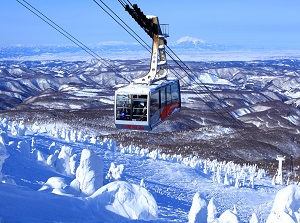
Hakkoda Ropeway in winter
Photo by Aomori Prefecture
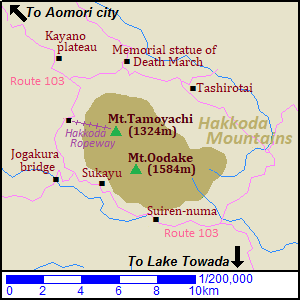
Tourist attractions around Hakkoda
Hakkoda is a group of volcanoes located about 20 to 25 km southeast of Aomori city.
In Japanese, "o" in the word is pronounced long, so it is read as "Hakkôda".
There are more than a dozen peaks as much as 1,200 to 1,500 meters high in this area.
The highest peak is Oodake (大岳, 1584 m).
These are the active volcanoes and are emitting volcanic gases here and there.
The volcanic activity is not so active, but Japan Meteorological Agency continues to observe the volcanoes every day.
This area is not so steep.
Many streams flow, so there are valleys and marshes in various places.
Around this area, very heavy snow falls in winter.
So Hakkoda mountains have one of most popular ski slopes in Japan.
On the other hand, 199 soldiers training in the snow died during a blizzard in 1902.
This incident was fictionaized and made into a movie in 1977.
So this incident has become widely known throughout Japanese people.
Most sightseeing spots are around the foot of the mountains.
Generally the route along west and south side of Hakkoda is called Omote-Hakkoda (表八甲田), which means "major route around Hakkoda".
National Route 103 connecting Aomori city and Lake Towada runs along this route, so the tourists visit the spots easily by public transportation.
The route along north and east side is called Ura-Hakkoda (裏八甲田), which means "minor route around Hakkoda".
This route is on a branch road away from the Route 103.
There is no public transportation to visit this route.
Omote-Hakkoda
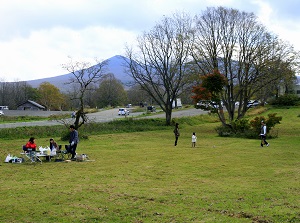
Kayano plateau
Photo by Aomori Prefecture
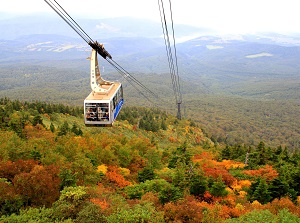
Hakkoda Ropeway
Photo by Aomori Prefecture

Tourist attractions around Hakkoda
Kayano plateau (萱野高原)
Kayano plateau is located about 15 km southeast of Aomori city, and is on the way of Route 103 to Hakkoda area.
It is at the level of 540 meters, and is covered with natural lawn.
We can see Hakkoda mountains, Aomori city and Aomori Bay from there.
There are a few shops, and they serve free tea.
They say that you will live long if you drink three cups of the tea.
Hakkoda Ropeway
Hakkoda Ropeway is near Tamoyachi peak (田茂萢岳, 1324 m).
It is operated through the year.
There is a walking trail from the station on the top, and we can enjoy strolling around there within an hour.
The station at the foot of the mountain is located about 21 km from Aomori station, and it takes an hour by route bus.
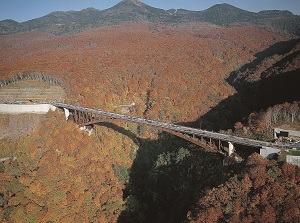
Jogakura bridge
Photo by Aomori Prefecture
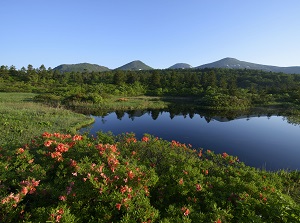
Suiren-numa
Photo by Aomori Prefecture
Jogakura bridge (城ヶ倉大橋)
Jogakura bridge is located 4 km south of the station of Hakkoda ropeway.
It spans over the Jogakura gorge and is located at the level of 122 meters from the bottom of the gorge.
This is one of the nice spots that we can enjoy the view of Hakkoda and Aomori city.
It is on the branched route from Route 103.
So when you use a route bus, you must walk for half an hour (about 1.8 km) after getting off it at Jogakura-onsen stop.
Sukayu hot spring (酸ヶ湯温泉)
Sukayu Onsen is a hot spring resort located 6 km south of the station of Hakkoda ropeway.
It is known for old therapeutic spa.
The details are described in the following page.
Suiren-numa marsh (睡蓮沼)
Suiren-numa is a marsh located 7 km northeast of the station of Hakkoda ropeway.
It is on the south side of Hakkoda mountains, and is spread near Route 103.
"Suiren" means "water lily", and a kind of water lily is growing naturally here.
We can enjoy the quiet with seeing the marsh and Hakkoda mountains.
Ura-Hakkoda
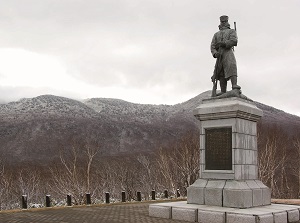
Memorial statue of the Hakkoda Death March
Photo by Aomori Prefecture
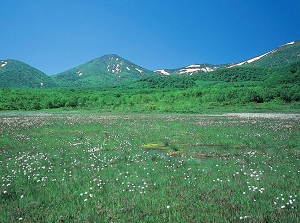
Tashirotai
Photo by Aomori Prefecture

Tourist attractions around Hakkoda
Memorial statue of the Hakkoda Death March (雪中行軍遭難記念像)
It is a statue located 5 km from the station of Hakkoda ropeway.
It is a memorial statue of the accident of Japanese soldiers in 1902.
The shape is a standing soldier.
In January of 1902, 210 soldiers of Japanese Army were training for marching in snow in Hakkoda.
They had needed to prepare for the war between Japan and Russia, but the training was reckless.
They had lost their way in heavy snow and severe blizzard in the mountain on the following day of departure from Aomori city.
On the third day, some soldiers froze to death and the number was increasing.
On the fifth day, a corporal in the corps was given a command to go to for help.
He departed, but had gotton struck in heavy snow.
Rescue teams had already sent from Aomori.
Then, at last, they found him in the heavy snow.
But it is said that he was standing upright to become a mark in snow in a state of apparent death.
By his information, the rescue operation started.
But 199 soldiers died.
The number of death became the world's worst mountaineering disaster in the modern history of mountain climbing.
The soldier of the statue is the corporal and the statue was built in 1907.
It is said that he was standing in the pose of the statue when he was found.
To visit here, you must walk on a steep path about 250 meters from the main road.
If you visit in winter, you may really lose your way in the snow.
Tashirotai marsh (田代平湿原)
Tashirotai marsh is located northeast side of Hakkoda mountains.
It is a statue located 11 km from the station of Hakkoda ropeway.
In summer, many wild flowers bloom, and we can enjoy the view of the flowers and grand Hakkoda mountains.
How to get here
By route bus for Lake Towada, from Aomori station, about 50 minutes to Kayano Plateau, about an hour to Hakkoda ropeway, about 1 hour and 10 minutes to Sukayu.
We cannot visit Ura-Hakkoda by route bus.

